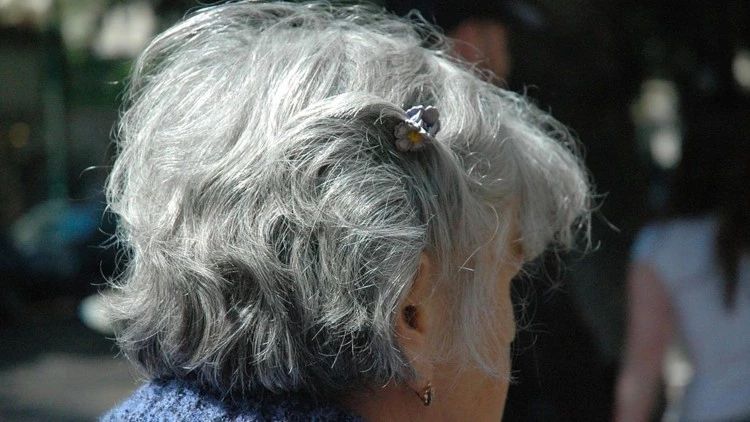导语 白头发不仅仅是老年人的烦恼,一些年轻人也备受困扰,但最近的一项研究发现,免疫系统会在我们的头发变成灰白色时发挥作用,白色的生成其实是身体的一项自我保护机制。
A new study has shed light on the role our immune system could play in our hair turning gray when we deal with stress or illness.
一项新的研究揭示了当我们在应对压力或疾病时,我们的免疫系统在我们的头发变得灰白时所扮演的角色。
Cells known as melanocytes make up melanin and give our hair its color. Special stem cells then add melanocytes to new follicles when our hair falls out. When these stem cells stop working, our hair loses its pigment. It is this process and its relationship with our immune system's defenses that scientists at the National Institutes of Health (NIH) and the University of Alabama, Birmingham, (UAB) set out to investigate—in mice.
被称为黑色素细胞的细胞组成了黑色素,并赋予头发颜色。当我们的头发脱落时,特殊的干细胞会将黑色素细胞添加到新的毛囊中。当这些干细胞停止工作时,我们的头发就失去了色素。美国国立卫生研究院(NIH)和阿拉巴马大学伯明翰分校(UAB)的科学家开始在老鼠身上进行研究,这一过程及其与免疫系统的防御的关系。
Our immune system is constantly defending us against viruses and bacteria, prompting cells under attack to produce signaling molecules called interferons. Interferons tell other cells to turn on the gene expression that prevents viruses from replicating, and trigger immune effector cells that protect the body.
我们的免疫系统不断地保护我们免受病毒和细菌的侵害,促使被攻击的细胞产生称为干扰素的信号分子。干扰素告诉其他细胞打开阻止病毒复制的基因表达,并触发免疫效应细胞保护身体。

Scientists believe the immune system could play a part in our hair turning gray.
科学家们认为,免疫系统可以在我们的头发变成灰白色时发挥作用。JD MASON/UNSPLASH
For their paper, published in the journal PLOS Biology, the authors studied how the immune system’s response to attacks affects the MITF protein, which helps melanocytes to function. They found that when MITF loses control of the interferon response in melanocyte stem cells, the hair can turn gray. What's more, mice genetically predisposed to developing gray hair had this response even when the immune response was turned on artificially. Further research is now needed to understand what caused these reactions and also to see if these effects occur in the human body too.
他们的论文发表在PLOS Biology杂志上,研究人员研究了免疫系统对攻击的反应如何影响MITF蛋白质,从而帮助黑素细胞发挥作用。他们发现,当MITF失去对黑素细胞干细胞中干扰素反应的控制时,头发会变成灰色。更重要的是,即使当免疫反应被人为地打开时,遗传倾向于发育成白发的老鼠也有这种反应。现在需要进一步的研究来了解造成这些反应的原因,以及这些反应是否也发生在人体中。
The scientists hope their research will offer new insights into diseases that affect pigmentation, including vitiligo, a condition that destroys pigment cells in the skin.
科学家们希望他们的研究能够为影响色素沉着的疾病提供新的见解,包括白癜风,这是一种破坏皮肤色素细胞的疾病。
Melissa Harris, lead author of the study and an assistant professor in UAB's Biology Department, said in a statement, "Genomic tools allow us to assess how all of the genes within our genome change their expression under different conditions, and sometimes they change in ways that we don't anticipate.”
该研究的第一作者,UAB生物系助理教授Melissa Harris在一份声明中表示:“基因组工具使我们能够评估基因组中的所有基因如何在不同条件下改变它们的表达,有时它们会以某种我们无法预料的方式改变。”
"We are interested in genes that affect how our stem cells are maintained over time. We like to study gray hair because it's an easy read-out of melanocyte stem cell dysfunction," Harris added.
“我们对影响我们干细胞长期维持的基因很感兴趣。我们喜欢研究灰色头发因为它很容易就能读出黑色素细胞的干细胞功能障碍,”Harris补充说。

William Pavan, chief of the Genetic Disease Research Branch at the NIH's National Human Genome Research Institute and co-author of the study, said in a statement, "This new discovery suggests that genes that control pigment in hair and skin also work to control the innate immune system.
美国国立卫生研究院国家人类基因组研究所遗传疾病研究分部主任,该研究的共同作者William Pavan在一份声明中表示:“这项新发现表明,控制头发和皮肤色素的基因也能够控制先天免疫系统。
"These results may enhance our understanding of hair graying. More importantly, discovering this connection will help us understand pigmentation diseases with innate immune system involvement like vitiligo," he said.
“这些结果可能会加深我们对头发变白的理解,更重要的是,发现这种联系将有助于我们理解像白癜风一样与先天性免疫系统有关的色素疾病,”他说。
The research follows a 2016 study by academics at University College London (UCL) that, for the first time, linked the gene called IRF4 to going gray.
这项研究是由伦敦大学学院(UCL)的学者在2016年进行的一项研究得出的,该研究首次将称为IRF4的基因与变灰关联起来。
The lead author, Kaustubh Adhikari of UCL's Cell and Developmental Biology Department, said in a statement at the time, “We already know several genes involved in balding and hair color, but this is the first time a gene for graying has been identified in humans, as well as other genes influencing hair shape and density.”
第一作者,UCL细胞与发育生物学系的Kaustubh Adhikari在当时在一份声明中表示:“我们已经知道多个基因涉及秃顶和头发颜色,但这是第一次在人类中发现发白的基因,以及影响头发形状和密度的其他基因。”
(责任编辑:周姚)

